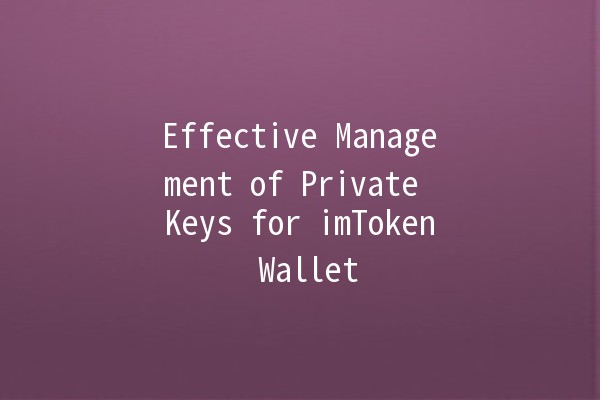Managing private keys securely is crucial for anyone using cryptocurrency wallets, especially for users of the imToken wallet. This article provides practical advice and techniques to enhance productivity regarding private key management, ensuring both security and ease of access.
Private keys are long strings of characters that serve as your digital signature, granting you access to your cryptocurrency assets. Without them, you cannot authorize transactions or recover lost wallets. For imToken users, proper management of these keys is essential to protect your investments.
The security of your cryptocurrency holdings depends largely on how well you manage your private keys. Poor management can lead to irreversible losses. Efficient key management not only secures assets but also enhances user experience.
Here are five specific techniques to improve your private key management system:
Explanation:

A password manager can securely store and encrypt your private keys along with your passwords.
Application Example:
By using tools like LastPass or Bitwarden, you can save your private key securely. Accessing the wallet on different devices becomes easier, as you can quickly retrieve your key without risking it being exposed in plain text.
Explanation:
Backing up your private keys in multiple locations ensures that you have access even if one backup fails.
Application Example:
Create paper backups of your keys and store them in a safe or use physical USB drives encrypted with software like VeraCrypt for digital backups. It's recommended to keep one backup at home and another in a secure offsite location.
Explanation:
Hardware wallets provide an offline method for storing your private keys, enhancing security against online attacks.
Application Example:
Devices like the Ledger Nano S or Trezor can be used for securely holding your imToken private keys. They are immune to malware that may target online wallets, providing an added layer of security.
Explanation:
2FA adds extra security to your wallet, making it harder for unauthorized users to access your assets.
Application Example:
Many wallets, including imToken, support 2FA. Use apps like Google Authenticator or Authy to generate timebased onetime passwords that are required along with your password for logging into your wallet.
Explanation:
Regularly changing your keys can minimize the risk of them being stolen or compromised.
Application Example:
If you suspect that your private key has been exposed or if you’ve engaged in large transactions, generate a new private key and transfer your assets to a new address. Always keep the old key secured until you confirm all transactions are complete.
A private key is a cryptographic key that allows you to access and manage your cryptocurrency holdings. It's vital because anyone with access to your private key can control your assets. Therefore, proper management and securing your private key is crucial to prevent unauthorized access.
If you lose your private key and don’t have a backup, recovery will be impossible. This is why it’s imperative to keep multiple backups. If you followed the backup strategies recommended, you could retrieve the key from your secured locations.
No, you should never share your private key with anyone. Sharing it puts your assets at risk. Always treat your private key like a password that grants access to your cryptocurrency funds.
If your device is compromised, an attacker may gain access to your wallet and private keys. Using hardware wallets is advisable for protection against such threats. Additionally, if you suspect a breach, transfer your assets to a new wallet immediately.
Storing private keys directly on your computer can be risky due to malware and hacking threats. Instead, use encrypted password managers or physical hardware wallets. An added safety measure includes keeping your private keys in offline environments.
No, the private key is the only means of accessing your crypto assets. Without it, you will lose access permanently. This underscores the importance of proper key management and regular backups.
When it comes to managing your imToken wallet's private keys, implementing effective strategies is essential for safeguarding your assets. Techniques such as using password managers, multiple backups, hardware wallets, twofactor authentication, and regularly rotating your keys can significantly enhance your security profile.
By adopting these practices, you not only reduce the risk of losing your assets but also streamline your access to them, making cryptocurrency management more efficient.
Embrace these strategies today to take control of your private key management and secure your digital assets effectively.